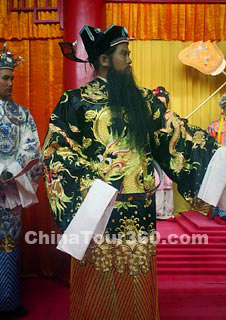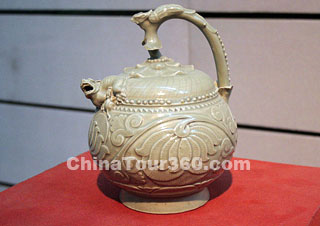 |
| Bao Zheng of the Song Dynasty |
Since 959 the Later Zhou Dynasty had much of the country under its control as advocated by the common understanding of the Five Dynasties' reunification aspiration. When Zhao Kuangyin, one of the commanding generals who led the imperial army in the Later Zhou regime, brought mutiny into play in Chenqiaoyi in 960, he seized power and established the Song Dynasty.
It was historically divided into two periods: the Northern Song (960 - 1127) when the capital was established in Dongjing (the present Kaifeng) and the Southern Song (1127 - 1279) when the capital was moved to Lin'an (the present Hangzhou). This division was created by nomadic invaders in North China who made breaks inward the Song court and finally overthrew the Northern Song. The Southern Song was established in the south of China.
Making a comparison among the Chinese dynasties, it is confirmed that the Song Dynasty together with the Tang (618 - 907) and the Han (206BC - 220AD) dynasties achieved immense levels of nation-wide prominence. Ruling China for more than 300 years, the dynasty boasted of its economic growth, artistic achievement as well as numerous scientific advances. Therefore, the period was also known as - the Chinese Renaissance.
![]() Great Achievements
Great Achievements
The scientific development in the Song Dynasty ranked forefront in the world of the time. The world-shaking China's three greatest inventions-the gun powder, compass, movable-type printing were invented at that time, which altered the whole world's civilized rate of progress. The abacus began to be used and had become the main calculating tool since then. The famous scientist and polymath Shen Kuo wrote a great book Meng Xi Bi Tan (Dream Stream Essays) which summarized many great scientific achievements during the Northern Song period and the time before.
![]() In economics, the earliest paper money called 'Jiao Zi' in the world appeared in the Northern Song period, which soon became the popular currency money of the time. This indicated the high development of the commerce especially in the capital Dongjing (the present Kaifeng). In addition, the development of
In economics, the earliest paper money called 'Jiao Zi' in the world appeared in the Northern Song period, which soon became the popular currency money of the time. This indicated the high development of the commerce especially in the capital Dongjing (the present Kaifeng). In addition, the development of
 |
| A Porcelain Pot of the Song Dynasty |
![]() In the area of astronomy, Yang Zhongfu wrote the Tong Tian Calendar which recorded 365.2425 days as the total time of a year and this record was totally same with that of the Gregorian calendar implemented in the West in 1582.
In the area of astronomy, Yang Zhongfu wrote the Tong Tian Calendar which recorded 365.2425 days as the total time of a year and this record was totally same with that of the Gregorian calendar implemented in the West in 1582.
![]() In medicine, the Taiping Holy Prescriptions was the first book on medicinal prescriptions compiled by the related departments in the Song court. This reflected that under economic stability, the government paid great attention to the common people's health; the development of medical care attested to the civilized degree of society in the Song Dynasty.
In medicine, the Taiping Holy Prescriptions was the first book on medicinal prescriptions compiled by the related departments in the Song court. This reflected that under economic stability, the government paid great attention to the common people's health; the development of medical care attested to the civilized degree of society in the Song Dynasty.
![]() In physiology, one of the most influential philosophers was Zhu Xi (1130 - 1200), whose doctrine was called 'Neo-Confucianism' - synthesis of Confucian thought and Buddhist, Taoist, and other ideas. It became the imperial ideology from latter period of the Song Dynasty and on. His teaching emphasized the obedience to the ruler which maintained the feudal hierarchy. To some degree this doctrine hindered the societal development of the time, however, the political, social, and spiritual stability were achieved many generations thereafter.
In physiology, one of the most influential philosophers was Zhu Xi (1130 - 1200), whose doctrine was called 'Neo-Confucianism' - synthesis of Confucian thought and Buddhist, Taoist, and other ideas. It became the imperial ideology from latter period of the Song Dynasty and on. His teaching emphasized the obedience to the ruler which maintained the feudal hierarchy. To some degree this doctrine hindered the societal development of the time, however, the political, social, and spiritual stability were achieved many generations thereafter.
![]() Go to the Liao Dynasty
Go to the Liao Dynasty







